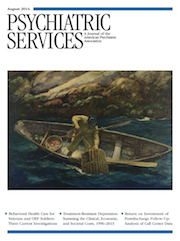Global Mental Health and Psychiatric Services
In this issue, Ni and colleagues report on a survey of medical outpatients in the city of Xi’an, China, that examined knowledge, attitudes, and help-seeking preferences regarding “neurotic disorders.” Xi’an, which has more than 3,000 years of history, is best known to tourists for the amazing terracotta army of Emperor Qin Shi Huang. The survey results showed that patients had limited knowledge of “neurotic disorders”—now an outdated term—which in the survey included only obsessive-compulsive disorder, social phobia, and panic, although survey items apparently addressed the entire category of neurotic disorders. The specific “cultural term” used for these inquiries is not clear from the report, and much may have been lost in translation. However, the findings are not surprising, and similar results would likely be obtained elsewhere, including in the United States. Epidemiologic surveys have indicated a low prevalence for most of these disorders in China.
Over the past decade, as emphasis has shifted from infectious and communicable diseases to noncommunicable ones and as awareness of the enormous cost and burden of mental disorders has grown, “global mental health” is coming of age. Journals and textbooks on the topic have proliferated, and initiatives such as NIMH’s collaborative hubs for international research on low- and middle-income countries have been implemented, with a major focus on capacity building in the context of primary care. As evidenced in leading U.S. journals, there are now active international contributions to scientific psychiatry, even from low- and middle-income countries. As with discoveries in Venezuela about Huntington's disease, important efforts to clarify the genetics of bipolar disorder and the therapeutics of Alzheimer’s disease are now being carried out in South America (the paisa population in Colombia).
Beyond the focus on genetics and neuroscience—and the universal finding that mental disorders are stigmatized—there is also significant interest in international experiences in regard to psychiatric services. As the Affordable Care Act is implemented, we realize that we can learn a great deal from other countries, not only about health care in general but also about the effective delivery and integration of mental health and primary care services. Indeed, cultural psychiatry has moved far beyond the “magic realism” of exotic syndromes reported from distant lands (so-called culture-bound disorders) by anthropologically oriented colleagues. With the influx of immigrants, global health has become local health, and international submissions to Psychiatric Services are expected to grow. International submissions, predominantly from Canada and European countries, account for about one-third of all submissions to the journal. So far in 2014, the journal has published more than 20 reports from other countries—at least three from low- and middle-income countries. I hope this commentary stimulates additional submissions that inform the state of mental health services in many corners of the globe.



